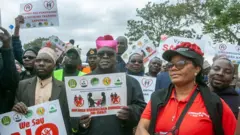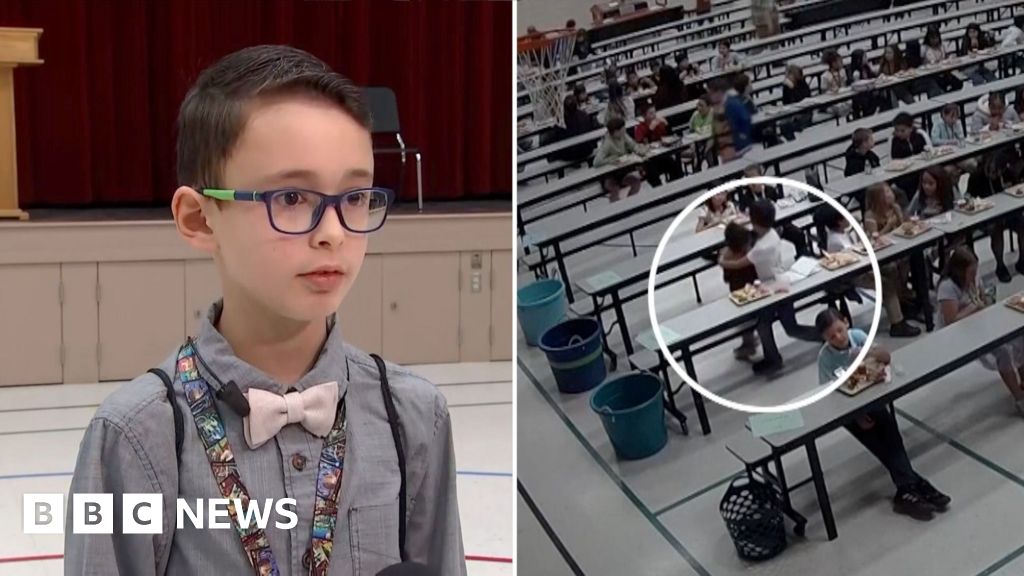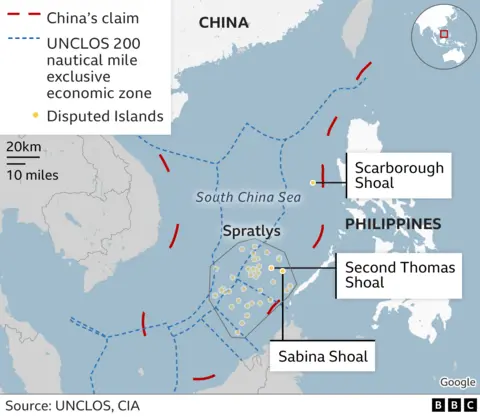Global religion reporter, BBC News
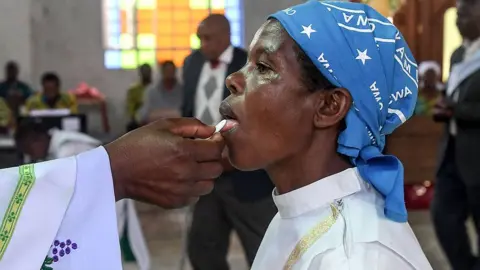 AFP
AFPIf the sole predictor of who would become the next Pope was where the Catholic Church is growing fastest, then it is almost certain he would hail from Africa.
The continent’s Catholic population is expanding more rapidly than anywhere else, representing more than half of the global increase.
While there have been at least three pontiffs from Africa, the last – Pope Gelasius I – died more than 1,500 years ago – many would argue it is high time for another.
When the cardinals who vote for the leader of the Roman Catholic Church – known as the cardinal-electors – meet at the Vatican to choose Pope Francis’ successor, will these facts influence their decision making?
“I think that it will be great to have an African Pope,” Father Stan Chu Ilo, a Nigerian Catholic priest and associate professor at DePaul University in Chicago, told the BBC, arguing that the leadership of the Church should better reflect the make-up of the global congregation.
But the cleric admitted it was more likely that the cardinals would pick someone who already had a high profile – “someone who is already an influential voice”.
“The challenge is that you don’t have any senior African clergy holding any important position today at the Vatican, and that poses a problem,” he said.
“If you think about African cardinals who are potential popes, who is prominent in global Catholicism today? The answer is none.”
A contrast, he said, to 2013 when Ghanaian Cardinal Peter Turkson was a strong contender for the position and 2005 when Nigerian Cardinal Francis Arinze was a potential candidate in the conclave that led to the election of Pope Benedict XVI.
This is despite Pope Francis increasing the proportion of cardinals from sub-Saharan Africa from 8% when he was elected in 2013 to 12% a decade later, according to US-based Pew Research Center.
“How it has come to this point for the continent of Africa and the Catholic Church is still something that surprises many of us, given Pope Francis’s openness to Africa,” Fr Chu Ilu said.
Francis visited 10 countries in Africa during his pontificate – a time that marked a dramatic increase in Catholics on the continent. They now make up 20% of the worldwide congregation, with the latest figures showing how they surged from 272 million in 2022 to 281 million in 2023.
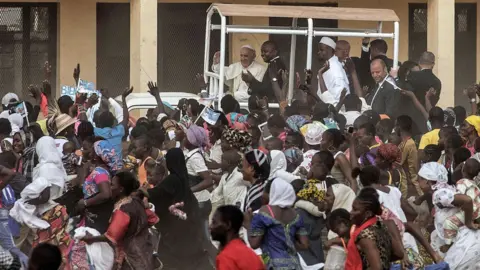 AFP
AFPBut some African Catholics do not like this emphasis on origin – like Father Paulinus Ikechukwu Odozor, a professor at Notre Dame University in Indiana.
For the Nigerian-born Catholic priest it just smacks of tokenism.
“It’s like people are saying, ‘OK, so Africans are growing in these numbers, so why don’t we give them a Pope,'” he told me.
“I have never been one to think that just because you come from Africa, or because you come from Europe, therefore you are prime candidate.
“No matter where you come from, as soon as you are elected, everybody’s issues become your issue. You have one concern, to build up the body of Christ, no matter where the people are, no matter how many they are, in whatever context they are.”
The most important thing, he told the BBC, was for the Pope to be “the chief theologian of the Church”.
“The Pope must be somebody who knows tradition very well” and was able to use that to give people direction, he said.
In his view, more needs to be done to ensure that matters affecting the faithful in Africa are taken seriously by those in positions of power at the Vatican.
He admitted that at times it felt “as if Africans don’t matter, or it’s as if their faith is seen as a little bit below par, or counterfeit, and should not be taken seriously”.
“When Africans feel that their issues are not on the table as they should be, then people begin to ask, well, maybe we can only get ourselves heard or seen if we have our own man there.”
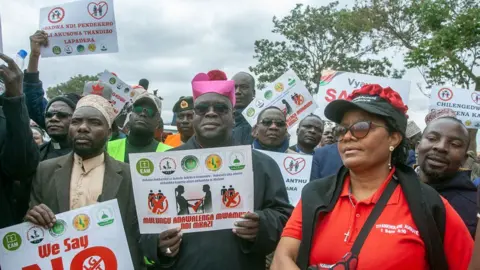 AFP
AFPPope Francis has been praised for his understanding of the poor and marginalised – which made him particularly loved in Africa.
For example, he spoke out against what he saw as the plundering of natural resources in places such as the Democratic Republic of Congo, a vast country which is home to Africa’s largest Catholic community with almost 55 million believers.
His role as peacemaker has also been commended – he went to great lengths to heal divisions following the brutal civil war in the Central African Republic, famously giving a ride on his popemobile to the imam who invited him to pray at a mosque in Bangui in 2015 and kissing the feet of South Sudan’s rival leaders four years later.
But Pope Francis did face a backlash from the African Church for his stance on LGBT issues.
Africa bishops rejected his 2023 declaration allowing priests to offer blessings to same-sex couples.
The Vatican clarified that the blessings “neither approve nor justify the situation in which these people find themselves”, and that “in several countries there are strong cultural and even legal issues that require time and pastoral strategies that go beyond the short term”.
It is an issue that seems to unite the continent, where homosexual relationships are outlawed in many countries.
The three African cardinals, mentioned by observers as possible, if not top, contenders – Turkson, Robert Sarah of Guinea and DR Congo’s Fridolin Ambongo Besungu – are all clear in their rejection of a change on this issue.
The Congolese cardinal has said “unions of persons of the same sex are considered contradictory to cultural norms and intrinsically evil”.
Cardinal Sarah, an arch traditionalist, has been damning about the West’s liberal attitudes, telling a Synod in 2015: “What Nazi-Fascism and Communism were in the 20th Century, Western homosexual and abortion ideologies and Islamic fanaticism are today.”
And while Cardinal Turkson has been critical of Ghana’s move to impose harsh penalties on LGBT people, he toes the line that same-sex relationships are “objectively sinful”.
Nonetheless Fr Odozor agreed that despite an increase in the number of cardinals from the African continent, they lack real power in the Church.
And both clerics interviewed by the BBC pointed to an issue that could hinder efforts that Pope Francis had made to make the leadership of the Church more representative – and the possibility of getting a pontiff from Africa.
“There is still that question of racism in the Church that we never even talk about,” Fr Odozor said.
“That could undermine someone, no matter how papal he is or what he does, he will be seen simply as an African Pope.”
As Pope Francis appointed 108 of the 135 cardinals eligible to vote in the conclave, there is a good chance they will choose someone whose emphasis is also on reaching out to the poor and disenfranchised.
It is an approach Fr Chu Ilo called a “poor-first” outlook, with a focus on being “a listening Church”.
But, as when Pope Francis was elected, he said the outcome would be unpredictable.
“I will answer like a good priest,” he told me chuckling, when asked for his prediction.
“I would pray that God will give us a Pope who will continue with the outlook of Francis, and I’ll pray that such a person comes from Africa.”
More on the death of Pope Francis:
 Getty Images/BBC
Getty Images/BBC